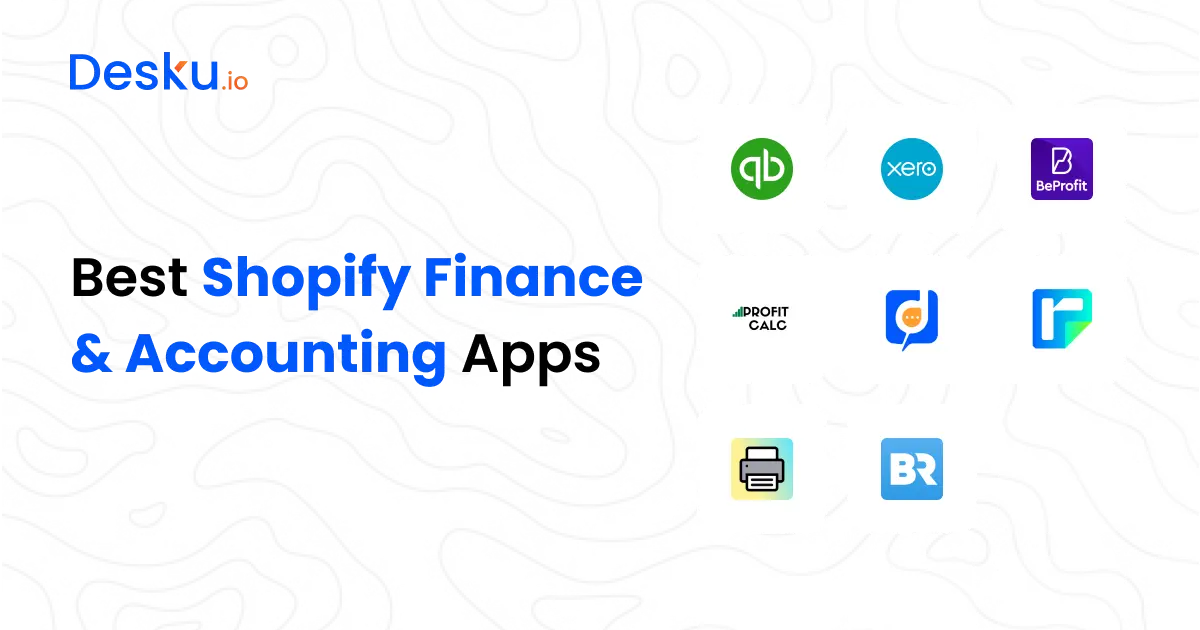Managing finances is a critical part of running a successful Shopify store, but it can be a challenge to handle everything manually. Whether you’re struggling with invoicing, keeping track of expenses, or generating custom financial reports, the right tools can make a world of difference. Fortunately, Shopify offers a wide range of finance apps designed to streamline these tasks and help you focus more on growing your business.
In this article, we’re going to explore the 7 best Shopify finance apps for 2024. From popular accounting software like QuickBooks Online and Xero to specialized tools like BeProfit and Profit Calc, these apps can help you automate financial tasks, gain better insights through analytics, and ensure seamless integration with your Shopify store. Whether you’re looking to sync your financial data or generate custom reports, we’ve got you covered. Let’s dive in and find the perfect app to boost your Shopify store‘s financial management!
Shopify has over 9,700 apps available in its App Store as of 2024, covering everything from marketing to inventory management. (source)
What are the Best Shopify Finance Apps?
Managing your Shopify store’s finances can feel overwhelming. Between tracking expenses, managing invoices, and ensuring accurate financial reporting, there’s a lot on your plate. But with the right tools, you can automate these tasks, streamline your processes, and focus more on growing your business.
In 2024, some apps stand out for their ability to seamlessly integrate with Shopify and simplify financial management. In this article, we’ll explore the 7 best Shopify finance apps that can help you manage your Shopify account and boost your profit margins.
We’ll cover popular options like QuickBooks Online and Xero, as well as specialized tools like BeProfit and Profit Calc. Whether you need help with invoicing, inventory management, or custom reports, there’s an app for every Shopify merchant. Let’s dive in!
The 7 Best Shopify Finance Apps
Here are the best Shopify finance apps that can help you streamline your financial management in 2024:
1. QuickBooks Online

Overview: A leading accounting software that integrates well with Shopify, offering tools for bank reconciliation, invoicing, and custom reports.
Best for: Store owners who need a comprehensive solution for all their financial management tasks.
Pros: Strong integration with Shopify, data export to Google Sheets, and detailed financial reporting.
Cons: The learning curve can be steep for new users.
Ratings: ⭐⭐⭐⭐⭐ (4.8/5)
Benefits:
- Streamlines financial management by syncing Shopify data directly with QuickBooks.
- Offers comprehensive tools for accounting tasks, from invoicing to tax preparation.
- Helps in generating detailed financial reports for better decision-making.
- Saves time with automation of manual tasks.
Key Features:
- Seamless integration with Shopify for automatic syncing of sales and expenses.
- Invoicing with customizable templates.
- Expense tracking and categorization.
- Custom reports for detailed financial insights.
- Bank reconciliation for accurate financial management.
- Payroll management and tax calculations.
2. Xero

Overview: A popular accounting app known for its ease of use and robust features.
Best for: Small to mid-sized e-commerce businesses looking for strong reporting and analytics.
Pros: Simplifies invoicing and bank reconciliation. Offers excellent integration with Shopify.
Cons: Limited inventory management features compared to other apps.
Ratings: ⭐⭐⭐⭐ (4.4/5 )
Key Features:
- Real-time financial data syncing with Shopify.
- Invoicing with automated reminders for overdue payments.
- Bank reconciliation with support for multiple currencies.
- Customizable financial reports and dashboards.
- Integration with over 800 third-party apps.
Benefits:
- Simplifies the accounting process with an intuitive and user-friendly interface.
- Supports multi-currency transactions, making it ideal for global businesses.
- Offers powerful tools for financial reporting and analytics.
- Automates everyday tasks, freeing up time for business growth.
3. BeProfit

Overview: A powerful tool for tracking profit margins and overall financial health.
Best for: Store owners looking to understand their profitability better.
Pros: Real-time tracking, easy integration with Shopify, and customizable reports.
Cons: May require additional setup for advanced features.
Ratings: ⭐⭐⭐⭐⭐ (4.9/5)
Key Features:
- Real-time profit and loss tracking.
- Customizable dashboards with key financial metrics.
- Expense tracking with detailed breakdowns.
- Integration with multiple sales channels, including Shopify.
- Reporting and analytics tools to track profitability trends.
Benefits:
- Provides a clear view of your store’s profit margins at a glance.
- Helps identify areas for cost reduction and profit improvement.
- Integrates smoothly with Shopify, making setup quick and easy.
- Offers customizable dashboards for better reports on financial health.
4. Profit Calc

Overview: A straightforward app focused on calculating and visualizing profit margins.
Best for: Stores needing simple and effective profit tracking.
Pros: Intuitive interface and easy to set up. Features allow you to track profits daily.
Cons: Limited features beyond profit calculation.
Ratings: ⭐⭐⭐⭐⭐ (4.8/5 )
Key Features:
- Daily profit calculation based on sales and expenses.
- Real-time updates on profit margins.
- Integration with Shopify and other e-commerce platforms.
- Customizable profit reports for different time periods.
- Expense categorization and tracking.
Benefits:
- Simple and straightforward profit tracking for small to medium-sized stores.
- Allows for quick insights into your store’s financial performance.
- Easy setup with minimal configuration required.
- Helps store owners make informed decisions based on profit data.
5. Report Pundit

Overview: A comprehensive reporting tool offering custom reports and advanced analytics.
Best for: Store owners needing detailed insights into their business performance.
Pros: Fully customizable templates for reports. Supports data export to various formats.
Cons: The app’s interface can be overwhelming for new users.
Ratings: ⭐⭐⭐⭐⭐ (5.0/5 )
Key Features:
- Custom report creation with over 80 pre-built templates.
- Integration with Shopify for real-time data access.
- Export reports to various formats, including Google Sheets.
- Automate report generation and scheduling.
- Detailed financial reporting with options for deep data analysis.
Benefits:
- Offers fully customizable reports tailored to your business needs.
- Saves time by automating routine reporting tasks.
- Provides deep insights into sales, customer behavior, and finances.
- Intuitive interface makes it easy to generate reports, even for beginners.
6. Order Printer

Overview: Ideal for generating invoices, packing slips, and other documents.
Best for: Store owners needing invoice and document automation.
Pros: Saves time with automated document creation. Integrates easily with Shopify.
Cons: Limited customization options for documents.
Ratings: ⭐⭐⭐⭐ (4.3/5)
Key Features:
- Create and print invoices, packing slips, and other documents.
- Customizable templates for different document types.
- Support for multiple languages and currencies.
- Integration with Shopify for automated document creation.
- Bulk printing options to save time.
Benefits:
- Saves time by automating the creation and printing of invoices and other documents.
- Customizable templates allow for branding consistency.
- Ideal for businesses with high order volumes needing efficient document management.
- Reduces manual errors with automated printing features.
7. Better Reports

Overview: A tool that offers in-depth reporting and analytics to help you understand your Shopify store performance.
Best for: Businesses needing advanced reporting capabilities.
Pros: Offers better reports with customizable templates.
Cons: It might be too detailed for small stores.
Ratings: ⭐⭐⭐⭐⭐ (4.9/5 )
Key Features:
- Advanced reporting and analytics tools.
- Over 60 pre-built report templates for Shopify data.
- Custom report creation with drag-and-drop functionality.
- Integration with Shopify and other third-party apps.
- Automate report scheduling and delivery.
Benefits:
- Offers better reports with highly customizable options, perfect for detailed analysis.
- Helps store owners understand trends and make data-driven decisions.
- Streamlines the reporting process, saving time and reducing manual work.
- Fully customizable reports help you track exactly what matters to your business.
Key Features to Look for in a Shopify Accounting App
When choosing the best accounting apps for your Shopify store, here are some features to consider:
Integration with Shopify:
Ensure the app can seamlessly integrate with your Shopify account and other tools you use, like QuickBooks Online or Xero.
Expense tracking and invoicing:
Look for apps that offer customizable templates for invoices, and that automate accounting tasks like tracking the cost of goods sold and currency conversion.
Reporting and Analytics:
The app should offer comprehensive reports that are fully customizable to meet your unique business needs.
Financial Reporting:
Accurate and detailed financial reporting is crucial. Tools like Report Pundit and Better Reports offer robust reporting features.
User-friendly interface:
Choose apps with an intuitive interface that makes it easy to navigate and save valuable time.
Budgeting and Financial Forecasting:
Apps that allow you to forecast profitability and manage your budget are key for long-term success.
FAQs
What is the best free Shopify accounting app?
Some apps offer free trials or limited features at no cost. For comprehensive features, QuickBooks Online or Xero might be worth the investment.
Can these apps help with tax filing?
es, many of these apps can assist with tax filing by automating tax calculations and generating necessary reports.
Do I need more than one accounting app for my Shopify store?
It depends on your needs. Some store owners use multiple apps for different tasks, like invoicing and reporting.
How do I ensure smooth integration with my Shopify account?
Choose apps that specifically mention Shopify integration in their features. Testing the integration with a free trial can also help.
Conclusion
Choosing the right finance app for your Shopify store is crucial for effective financial management. The apps we’ve highlighted, from QuickBooks Online and Xero to BeProfit and Report Pundit, offer a range of features designed to simplify your accounting tasks, provide insightful analytics, and save you valuable time.
By integrating one of these top-rated apps with your Shopify store, you can streamline your financial processes, improve your decision-making, and ultimately boost your profitability. Whether you’re a small business looking to get a handle on your expenses or a growing e-commerce operation needing advanced reporting, there’s a Shopify finance app out there that’s perfect for you. Take the time to explore your options and choose the one that best fits your business needs.










